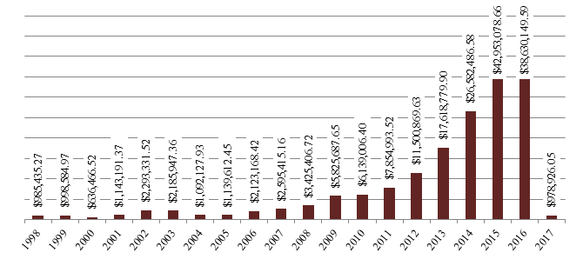Industry Insights
December 28, 2017
Langham: Attorney Fee Distribution Remains Similar
- State: Florida
- - 0 shares
Attorney fees are a consistent interest in the Office of Judges of Compensation Claims Annual Reports. Much of the focus seems to be on the attorney fees approved in a given fiscal year, reported recently in Attorney Fees in Florida Increased. Those figures represent only the amount of fees “approved” during each respective fiscal year.

Judge David Langham
During any particular fiscal year, fees might be approved on cases for which the date of accident was also during that particular fiscal year. More likely, the approved fee might be related to a date of accident prior to that fiscal year, perhaps many years prior. In 2016-17, fees were approved regarding 51 distinct accident-date years. That is reasonably consistent with prior years.
In 2016-17, attorneys’ fees were approved on a 1943 date of accident (a 74-year-old claim). This case illustrates the manner in which claims can occur and not come within the OJCC jurisdiction for a significant period. That case was opened in 2016 with the filing of a petition for benefits. Certainly, there may have been previous litigation on the case, prior to the OJCC becoming part of the Division of Administrative Hearings (DOAH). However, the first record that this agency has regarding this case is the petition for benefits (PFB) filed more than 70 years after the accident.
Most fees approved during any particular fiscal year will be associated with accidents that occurred prior to that particular fiscal year. This is because most cases in the OJCC system are not related to accidents in any current fiscal year, and because many cases in the workers’ compensation system remain active, with periodic litigation issues, for many years. Logically, therefore, most litigated cases within the responsibility of the OJCC at a particular time involve dates of accident prior to any current fiscal year.
The claimant fees approved in fiscal 2016-17, for accident dates in the last 20 years, are illustrated in this graph. The volume of fees has increased, as noted above, but the distribution each year is persistently similar.

The vast majority, approximately 88% of the fees approved in 2016-17, related to accident dates in the 10 years between Jan. 1, 2007, and Dec. 31, 2016, a notable increase. For comparison, the similar 10-year period prior to 2015-16 represented 80%, and the 10 years prior to 2014-15 represented 79%. That 10-year period, prior to each annual report year, has been reasonably consistent, between 77% and 80% for the five years prior to 2016-17.
Generally, the highest single “accident date year” in the annual fee analysis is the year two years prior to any particular Annual Report. This is illustrated again above for 2016-17 in the chart.
This illustrates two points. First, the most recent accidents historically account for the vast majority of claimant attorneys’ fees approved, or awarded each fiscal year. Second, the most significant accident year for claimant attorneys’ fees is usually two years prior to the reporting year. This is overall consistent with the resolution of cases demonstrated above.
Petitions are filed, the state mediation and final hearing processes engage and, as resolution occurs, the fee issues are resolved. Despite the notably short statutory time frames for mediation (130 days) and trial (210 days), it is unlikely that most cases will reach the point of fee awards in the first 12 months after accident date.
Of the claimant attorneys’ fees approved in 2005-06, only 2% were for dates of accidents more than 20 years prior to that fiscal year. That percentage rose and then stabilized for much of recent history. However, the 2016-17 figures represent a return to a slightly lower figure related to the oldest claims.
This illustrates that claims on dates of accident older that 20 years have also increased in terms of their proportion to the whole but still do not represent a significant part of the fee awards and stipulations.
David Langham is deputy chief judge of the Florida Office of Judges of Compensation Claims. This column is reprinted, with his permission, from his Florida Workers' Comp Adjudication blog.
Advertisements
Columns
- Montgomery: State's First Responders May File Comp Claims for Trauma 11/14/25
- Snyder: Use This New Survey to Negotiate Better 11/12/25
- Holden: Workers' Compensation Act Withstands Another Constitutional Attack 11/11/25
- Gelman: Sherrill's Win Locks in Worker Protections 11/10/25
- Kamin: Newsom Promises SIBTF Reforms in 2026 11/07/25
- Kamin: Comp Costs Hit Highest Combined Ratio Since 2001, WCIRB Says 11/05/25
- Montgomery: DIR to Blow $1.25M on Another Questionable Comp Study 11/03/25
- Wroten: California Sets the Standard as New Study Links Workplace Injuries to Heat Exposure 10/29/25
- Kamin: En Banc Clarifies Policy Reporting Requirements 10/27/25
- Gelman: PTSD-Stricken Officer's Disability Claim Denied 10/22/25
- Snyder: TAG a Structured Settlement Broker 10/17/25
- Snyder: New Medi-Cal Rules Can Affect Your Settlement 10/15/25
- Fish: Guarding Against PTSD Overdiagnosis 10/10/25
- Montgomery: DWC's MPN List Disappears Yet Again 10/08/25
- Ferguson: A Tribute to Thomas Chapman Lynch 10/06/25
- Gelman: Workers' Compensation Lien Secures Damages 10/03/25
- Paduda: Hot Stuff From WCRI 09/29/25
- Gelman: Trial Judge Deference Prevails 09/26/25
- Zachry: Injured Workers Aren't Always Lying 09/24/25
- Kamin: The Difference Between 'Sudden and Extraordinary' and 'Violent Act' Exceptions 09/22/25
Now Trending
- Workers' Compensation News
-
Calif. 2nd DCA: No
Exception to Statutory Requirement
That Medical Professionals…
Posted on Nov 12, 2025
-
Calif. Commenters
Urge DWC to Ban Outsourced
Training, Tighten Voucher…
Posted on Nov 17, 2025
-
Calif. Company to
Pay $125,194 for Exposing Workers
to…
Posted on Nov 12, 2025
-
Calif. DWC
Proposes Updating Mental Health…
Posted on Nov 17, 2025
-
Fla. Forfeiture of
Benefits for Prior Shoulder Injury
Doesn't Bar Award for Later…
Posted on Nov 14, 2025
-
Mo. Court Upholds
Verdict for Worker on Retaliation
Claim, Sanctions on…
Posted on Nov 10, 2025
-
Texas TDI Issues
Data…
Posted on Nov 10, 2025
-
Wash. Supreme
Court Says Traveling Employee
Doctrine Applies in Occupational…
Posted on Nov 10, 2025
-
Wis. Lawmakers to
Review Agreed-Upon…
Posted on Nov 11, 2025
-
Colo. Governor
Again Pushes Privatization as
Budget…
Posted on Nov 13, 2025
Jobs
Upcoming Events
Mar 25, 2026
SAVE THE DATE-CAREER & INTERN
Career Services at California Lutheran University presents the Career & Intern Expo 2026, which wi …
Social Media Links
c/o Business Insurance Holdings, Inc.
Greenwich, CT 06836




No Comments
Log in to post a comment